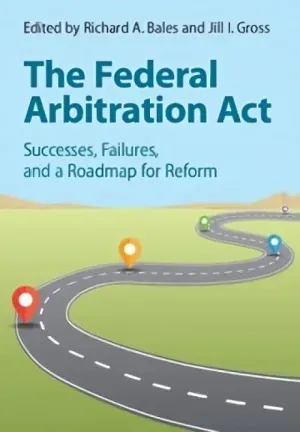The Federal Arbitration Act: Successes, Failures, and a Roadmap for Reform
Publication Date: December 5, 2024
The Federal Arbitration Act: Successes, Failures, and a Roadmap for Reform (Cambridge University Press, 2024)
Co-edited by Richard A. Bales and Jill I. Gross, The Federal Arbitration Act: Successes, Failures, and a Roadmap for Reform marks the centenary of the FAA by gathering thirty leading arbitration scholars and practitioners to assess the Act’s legacy and chart a course for reform. Congress enacted the FAA in 1925 to make arbitration agreements enforceable on the same footing as other contracts. For decades, its scope was limited, but since the 1980s, the Supreme Court has expansively interpreted the FAA to apply to statutory, employment, and consumer disputes. This transformation has made arbitration central to securities, construction, labor and employment, sports, and international disputes, but also raised concerns when arbitration agreements are imposed through contracts of adhesion on parties with little bargaining power.
The book is organized in eight Parts, corresponding to sections of the FAA in need of reform. Part I examines the FAA’s history and political context. Part II critiques enforcement doctrines, including structural bias, delegation clauses, and securities arbitration. Part III explores the FAA’s relationship with state law and proposals to restore federal-state balance. Part IV addresses federal court jurisdiction, jury trial provisions, and arbitral subpoenas. Part V considers the FAA’s impact on employment and consumer contracts, including transportation worker exemptions, the Ending Forced Arbitration Act, and class action waivers. Part VI rethinks standards for confirming and vacating awards. Part VII focuses on diversity, equity, and inclusion in arbitration. Part VIII looks to the future, including modernization proposals and comparative perspectives.
The book’s distinctive feature is its plurality of perspectives. Contributors represent a diverse mix of empiricists and theorists, senior luminaries and rising scholars, and a spectrum of political viewpoints. The editors intentionally curated chapters that do not always agree, providing lawmakers and courts with a range of options for reform. This approach underscores the book’s role as both a scholarly resource and a policy blueprint for updating a statute whose language and jurisprudence are often outdated and ill-suited to contemporary disputes.
Intended for academics, practitioners, policymakers, and students of arbitration and dispute resolution, the volume offers a comprehensive, critical, and forward-looking treatment of the FAA. It highlights both the successes of arbitration in providing efficient dispute resolution and the failures in ensuring fairness and accountability, ultimately proposing a roadmap for legislative and judicial reform in the FAA’s second century.


